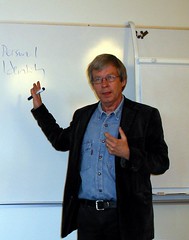March 25, 2008
Yay for Cybrids and Prepersons from the Future!
 The Torygraph writes that the Embryology bill is a beacon of hope because it will allow useful research on stem cells, despite involving animal human hybrids. The usual suspects are against it for the usual reasons, i.e. the yuck factor involved in breaching species boundaries (despite these boundaries being porous and broken every day for the last decade or so in many biolabs), manipulating human tissue that could conceivably become a person, anti abortion views and occasionally general anti-science views.
The Torygraph writes that the Embryology bill is a beacon of hope because it will allow useful research on stem cells, despite involving animal human hybrids. The usual suspects are against it for the usual reasons, i.e. the yuck factor involved in breaching species boundaries (despite these boundaries being porous and broken every day for the last decade or so in many biolabs), manipulating human tissue that could conceivably become a person, anti abortion views and occasionally general anti-science views.
The Telegraph article actually suggests that the last aspect is the main reason the Catholic Bishop's oppose it: scientific understanding of human development can profoundly undermine the traditional view of human nature, human dignity and the human species.
The problem is of course that if the true state of affairs is just atoms and void, then any concept built on an incorrect description of the world will be invalid and likely misleading. An account of human dignity based on the existence of vital spirits that do not actually exist is not ethically relevant, it is just a fairy tale. It might be that an empirical description of the world does not contain all relevant knowledge, but at the very least understanding the physical world is a part of the knowledge.
(This view is problematic: how do we ever get this relevant knowledge? A dualist answer, that it somehow gets put into the physical world by external forces, is vulnerable to empirical observation of this emergence, suddenly turning the non-physical part of the world into something partially empirically observable. A rationalist answer, that we can deduce it logically, is equally problematic for the anti-research view since it suggests that we need to think as well as check the deductions against the real world - i.e. more research).
Perhaps the biggest problem with the bill is that the debate has become "yuck! it is immoral!" vs. "It is not immoral! It is useful!" - stem cells are likely to become useful, but we have no guarantees. It would be better to focus on the issue of what we want to use as definition of human and personhood. Having human mitochondrial DNA, human genes or human nerve cells does not make a mouse human; having a human-like mind does. Human dignity is usually used as a substitute for other ethical concepts, usually respect and autonomy. While we can in principle respect anything, the kind of deep respect we usually think of when talking about human dignity is respect for persons - entities that at the very least have identity. Blastocysts make bad carriers of personhood since they split, merge and die so randomly. Autonomy is not possible until you have a brain and mind that can be autonomous.
We might respect a preperson (e.g. a fertilised egg) in the sense that we think it will become a person with autonomy sometime in the future, and hence we expect the future person to have interests in the well-being or modification of the preperson. While the current preperson does not have any rights or interests, we might still have some obligations not to act (or to act) in certain ways towards it, just as we might have obligations to the dead. They are not as strong as the rights of the living, but we tend to at the very least regard it as socially good to respect them. But if an object will not become a person (say a fertilised egg that will never be implanted), then there will be no interests from the future at stake. At most we might want to avoid confusion due to the object being indistinguishable from a prepersion (egg A will be implanted, egg B will not - they could be physically identical yet have different future interests), but this could be done by clearly separating stem cell research from reproduction medicine.
[The photo is of noted utilitarian Torbjörn Tännsjö during a conference I organised. As far as I know his views he is just as gung ho about embryo research as I am, if not more. However, he would probably discount much of my rights fluff. ]